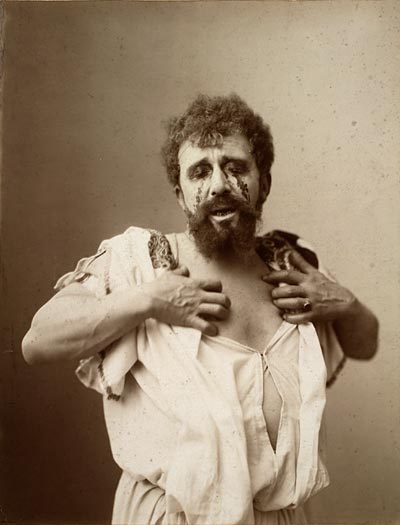This week I finally finished reading the tragic play Oedipus Rex. I was not only horrified, but a strong wave of emotions overcame me. I felt a burning feeling of disgust and anger against Oedipus, but I also had compassion for him. It was impossible for me not to feel bad for Oedipus. He lives his life without ever knowing his parents are not his true biological parents. He kills his real father and marries and conceives children with his real mother while being the King of Thebes. His character flaw of Hubris is very present throughout the entire play which makes me and the audience cringe. The ending is the most horrifying part of the play. He literally digs his own eyeballs out with his mom-wife's broaches. He no longer believes he is deserving of the gift of sight, for he hadn't seen what was right in front of him all along. The play turned out to be what I was expecting and was prepared for. Although it was quite disturbing while reading, I enjoyed how I was able to see the fantastic dramatic irony within the play.
After reading and annotating Oedipus Rex, I got a better understanding of dramatic irony and the importance of fate and myth. Throughout the whole play I was on the edge of my seat, even though I already had the knowledge of the ending. I find it interesting how there is a big difference between people's idea of fate nowadays and back then. It used to be a certain set in stone thing that couldn't be changed unless the gods chose to do so. In present times, we think we have the ability to alter our fate and be in charge of our life's path. I think that this week was a great experience to learn how to spot literary devices and things like hubris in literature. I really look forward to creating the tragic hero project now that I have a much better understanding of tragic heroes.
Sunday, January 26, 2014
Sunday, January 19, 2014
Reflection
Last week in class, we began reading the play Oedipus Rex. I knew nothing of the story, but now I find it very interesting and attention grabbing. At parts I get confused but because the general plot of the story was explained beforehand I am able to figure out what is happening. I am only a few paragraphs in but already I know I am going to like this play. Tragedies are something our society isn't very familiar with because our happy ended books and movies so I am excited to get exposed to something new. I can't help but feel pity for Oedipus as I read about his bad lack. He has no control over his fate and is in a time of helplessness. As the reader, it is painful because I know so much more than Oedipus as he continues to make mistakes. I really like that the play is full of so much irony, dramatic and verbal, because it makes it exciting.

In a past Language Arts class we studied similar concepts of Greek mythology when we read The Odyssey. The presence of the Greek gods seem to have a big presence in Greek theater and are very relevant in both The Odyssey and Oedipus Rex. I find Greek gods sometimes confusing because the myths they belong in seem very unrealistic. For the most part, I am very excited to finish the play of Oedipus Rex and discuss the irony in it because that is what interests me most. I am very anxious to continue learning about Oedipus' journey and find out how his misfortunes turn out in the end.
In a past Language Arts class we studied similar concepts of Greek mythology when we read The Odyssey. The presence of the Greek gods seem to have a big presence in Greek theater and are very relevant in both The Odyssey and Oedipus Rex. I find Greek gods sometimes confusing because the myths they belong in seem very unrealistic. For the most part, I am very excited to finish the play of Oedipus Rex and discuss the irony in it because that is what interests me most. I am very anxious to continue learning about Oedipus' journey and find out how his misfortunes turn out in the end.
Thursday, January 16, 2014
Oedipus Rex Inventory
Oedipus Rex
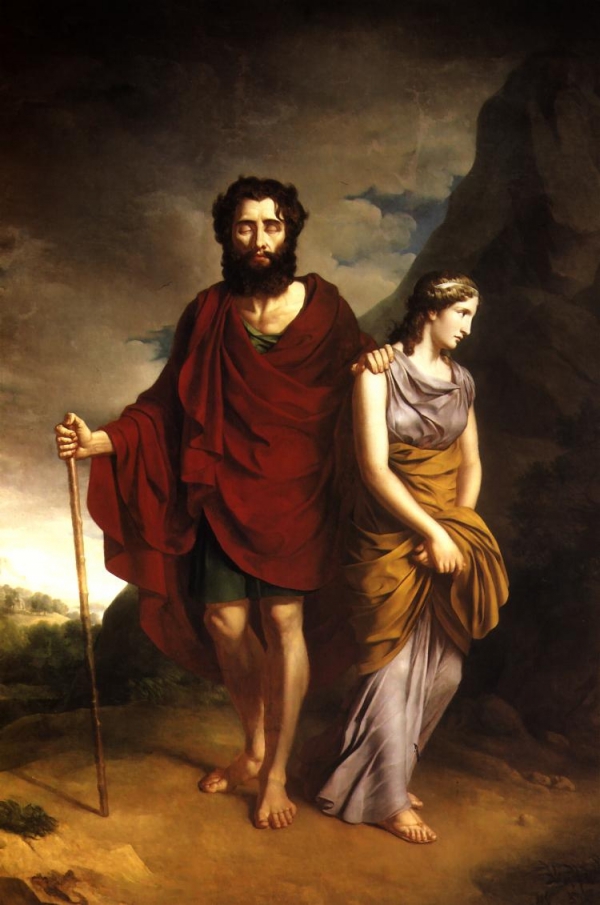
- Man
Oedipus Rex is a character in Greek mythology. He is originally the song of King Laius and Queen Jocasta. After a fateful prophecy from the Oracle of Delphine, where it stated that he would kill his father and marry his mother, Oedipus is sent away. After many years of no contact, he come back, only to unknowingly kill his father in a fight and marry his mother with whom he bore two children. He is the mythical king of Thebes and is said to represent two themes: the flaw in humanity and the course of destiny in a universe.
- Play
The play of Oedipus Rex was a play that was played during the christening of Dionysus, the Greek god of wine, in ancient Greek times. Originally being written by Sophocles, the play, which has been made into different versions all across the globe, centers around the main themes of fate and human flaw. To a certain extent, the play has also been used in political cases, where many politicians believe the Oedipus has done these deeds of killing his father and marrying his mother because of his desire for power.
- Myth
In Greek mythology, Oedipus is the true mythic king of Thebes, the city in which he kills his father and marries his mother. As myth says, Jocasta, his wife and mother, kills herself after finding out about her actual relationship with Oedipus. After years of ruling Thebes, Oedipus dies at Colonus, a town near Athens, and was swallowed by the Earth to become a guardian hero of Greece.
Greek Theater


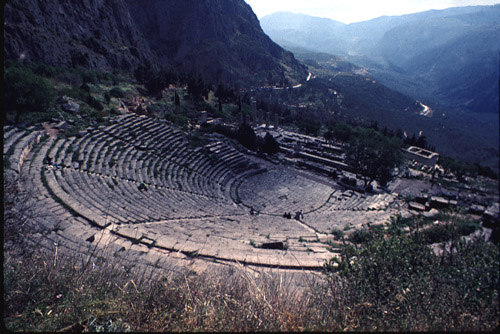
Ancient Greek theaters were very large, open-air structures that took advantage of sloping hillsides for the terraced seating. The audience sat in the theatro, the "seeing place", on semi-circular terraced rows of benches. The core of any Greek theater is the orchestra, the "dancing place" of the chorus and the cheif performance space. Masks served several important purposes in Ancient Greek theater. The masks' exaggerated expressions helped define the characters the actors were playing and they allowed actors to play more than one role and/or gender.
Sophocles

Sophocles was born 496 BC in Colonus (a city near Athens) and died 406 BC in Athens. He was wealthy from birth, highly educated, and noted for his grace and charm. He is one of Athens' greatest tragic playwrights. The best know of his 123 dramas is Oedipus Rex.
Dramatic Irony

dramatic irony is a literature device in which the audience has knowledge of information that the characters do not know. The words and actions of the characters therefore take on a different meaning for the audience than they have for the play's characters. Dramatic irony is a common plot device in many plays, including Romeo and Juliet and Oedipus Rex.
Aristotle

Aristotle (384 BC- March 7 322 BC) is a Greek philpsopher. He is one of the most important philosophers in the history of Western civilization. It is said Aristotle wrote hundreds of books, but only a much smaller number survive.
- Tragedy

“A tragedy is the imitation of an action that is serious and also, as having magnitude, complete in itself; in appropriate and pleasurable language;... in a dramatic rather than narrative form; with incidents arousing pity and fear, wherewith to accomplish a catharsis of these emotions.” - Aristotle. Aristotle said that tragedy has six main elements: plot, character, thought, diction, melody and spectacle. Aristotle was a great admirer of Sophocles' Oedipus Rex because he thought it was the perfect tragedy and the play fit his analysis perfectly.
- Hubris

"Hubris consists in doing and saying things that cause shame to the victim... simply for the pleasure of it. Retaliation is not hubris, but revenge... Young men and the rich are hubristic because they think they are better than other people." - Aristotle. In ancient Greece, the word hubris was used to describe actions of those who challenged the gods or their laws, especially in Greek tragedy, resulting in the protagonist's downfall.Aristotle believed that people indulge in crimes only to fulfill their basic desire to make themselves feel superior to others.
Teiresias
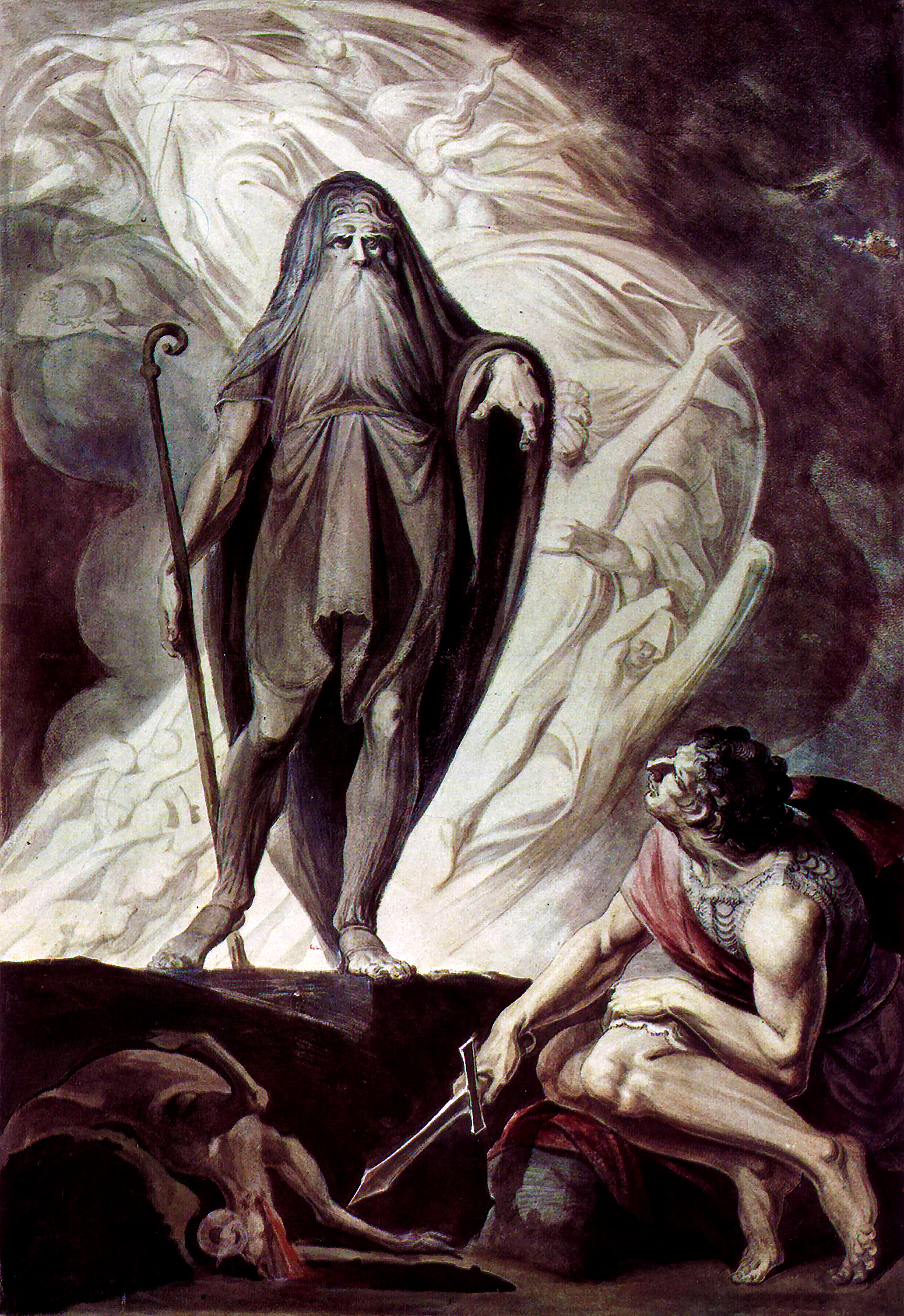
Teiresias was the son of Everes, and was also a blind prophet. According to Greek mythology, he was the most famous soothsayer of all ancient Greece. He was made blind by Here when he sided with Zeus over an argument. He makes appearances in Greek mythology a lot, usually being affiliated with the Oracle of Delphi.
Fate
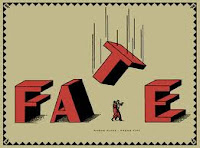
Fate is a literary device that is used in almost all literature. A lot of times, fate is an outside force acting independently, and is also something that we have no control over. Additionally, we see that fate is often something that can change the entire plot line of the story. Many religions across the world believe that fate is something being controlled by a supreme being such as a god.

- Man
Oedipus Rex is a character in Greek mythology. He is originally the song of King Laius and Queen Jocasta. After a fateful prophecy from the Oracle of Delphine, where it stated that he would kill his father and marry his mother, Oedipus is sent away. After many years of no contact, he come back, only to unknowingly kill his father in a fight and marry his mother with whom he bore two children. He is the mythical king of Thebes and is said to represent two themes: the flaw in humanity and the course of destiny in a universe.
The play of Oedipus Rex was a play that was played during the christening of Dionysus, the Greek god of wine, in ancient Greek times. Originally being written by Sophocles, the play, which has been made into different versions all across the globe, centers around the main themes of fate and human flaw. To a certain extent, the play has also been used in political cases, where many politicians believe the Oedipus has done these deeds of killing his father and marrying his mother because of his desire for power.
- Myth
In Greek mythology, Oedipus is the true mythic king of Thebes, the city in which he kills his father and marries his mother. As myth says, Jocasta, his wife and mother, kills herself after finding out about her actual relationship with Oedipus. After years of ruling Thebes, Oedipus dies at Colonus, a town near Athens, and was swallowed by the Earth to become a guardian hero of Greece.
Greek Theater



Ancient Greek theaters were very large, open-air structures that took advantage of sloping hillsides for the terraced seating. The audience sat in the theatro, the "seeing place", on semi-circular terraced rows of benches. The core of any Greek theater is the orchestra, the "dancing place" of the chorus and the cheif performance space. Masks served several important purposes in Ancient Greek theater. The masks' exaggerated expressions helped define the characters the actors were playing and they allowed actors to play more than one role and/or gender.
Sophocles

Sophocles was born 496 BC in Colonus (a city near Athens) and died 406 BC in Athens. He was wealthy from birth, highly educated, and noted for his grace and charm. He is one of Athens' greatest tragic playwrights. The best know of his 123 dramas is Oedipus Rex.
Dramatic Irony
dramatic irony is a literature device in which the audience has knowledge of information that the characters do not know. The words and actions of the characters therefore take on a different meaning for the audience than they have for the play's characters. Dramatic irony is a common plot device in many plays, including Romeo and Juliet and Oedipus Rex.
Aristotle
Aristotle (384 BC- March 7 322 BC) is a Greek philpsopher. He is one of the most important philosophers in the history of Western civilization. It is said Aristotle wrote hundreds of books, but only a much smaller number survive.
- Tragedy

“A tragedy is the imitation of an action that is serious and also, as having magnitude, complete in itself; in appropriate and pleasurable language;... in a dramatic rather than narrative form; with incidents arousing pity and fear, wherewith to accomplish a catharsis of these emotions.” - Aristotle. Aristotle said that tragedy has six main elements: plot, character, thought, diction, melody and spectacle. Aristotle was a great admirer of Sophocles' Oedipus Rex because he thought it was the perfect tragedy and the play fit his analysis perfectly.
"Hubris consists in doing and saying things that cause shame to the victim... simply for the pleasure of it. Retaliation is not hubris, but revenge... Young men and the rich are hubristic because they think they are better than other people." - Aristotle. In ancient Greece, the word hubris was used to describe actions of those who challenged the gods or their laws, especially in Greek tragedy, resulting in the protagonist's downfall.Aristotle believed that people indulge in crimes only to fulfill their basic desire to make themselves feel superior to others.
Teiresias

Teiresias was the son of Everes, and was also a blind prophet. According to Greek mythology, he was the most famous soothsayer of all ancient Greece. He was made blind by Here when he sided with Zeus over an argument. He makes appearances in Greek mythology a lot, usually being affiliated with the Oracle of Delphi.
Fate

Fate is a literary device that is used in almost all literature. A lot of times, fate is an outside force acting independently, and is also something that we have no control over. Additionally, we see that fate is often something that can change the entire plot line of the story. Many religions across the world believe that fate is something being controlled by a supreme being such as a god.
Monday, January 13, 2014
Baraka
Baraka captures everything from famine, to war,
to tribal rituals, prayer sessions, and the factories that produce much of the
merchandise and food we consume today. Last year were focused a lot on
concepts much bigger than ourselves. We looked at societal flaw and the
exposing of those issues in pieces of writings like A Modest Proposal, The One Great
Heart and Lord of the Flies. Baraka does a fantastic job without using
words at capturing the world’s flaws and making them clear to the audience
without using. World Literature serves the same purpose and has become a way to
create change in the world. The power of the images in Baraka can change a person
if they are able to look at their underlying meaning. Along with this Baraka evokes much
wonderment and compassion from the viewer. At the beginning of the movie there
are slow and peaceful images that create an overall calm and happy feeling. I
felt tranquility from the images of the Andes Mountains that captured the
beauty of an area that is not highly populated. I got a sense of hope that the
world is full of selfless people from the images of people in prayer that
humble themselves before God. The image of the man who seems to be going insane
shows the stress in our society and how we may be going downhill. There is a
large flow of emotions that were evoked from the images in Baraka that no other movie
has made me feel.
The most impactful images in this film were often the simplest ones. Scenes that got to me the most were the ones of the African tribes that gathered and danced, chanting and just being together. These images opened my mind and reminded me that my lifestyle is no better than theirs... it is only different. I think the people living in Boulder County get so wrapped up in their own lives that they forget that there are other people in the world that seem to be happier than us but have far less than what we have. The people in the tribes are content with their simple lives. A scene that angered me to no end was the one with the egg factory with the chicks being piled on top of each or and thrown around like they were stuffed animals. This scene made me sick and sad because our world has become more focused on producing and selling rather than quality.
My ideas are somewhat similar to Brussat's ideas in that we both find sadness in the fact of the overpopulation and mass production. She mentioned she was humbled by the images of the tribal people which is the same emotion I felt during those particular scenes. The movement and music in Baraka directly relates to the images of the scene. When the music is fast paced and upbeat the scenes where usually hopeful and happy. The tribal scenes had music that was exciting and upbeat because the people were energetic and happy. The music became more chaotic in the fast busy city scenes. The music switched course and became sad and depressing in a lower key when the Cambodian genocide and holocaust scenes came around. I could feel the persons thoughts and got a chance to read their face when the camera slowly focused in on a individual's face. I got time to guess and try to understand what they were thinking.
I think Baraka is targeting the average ignorant person that thinks the world revolves around them. The film shows different cultures that hopefully inspire people to become more as one with the world and to see there is more to the universe than just themselves. Baraka reveals flaws in society so humans will hopefully correct them. This film is hopefully inspiring people to improve themselves and become more aware of the world around them.


Subscribe to:
Comments (Atom)
